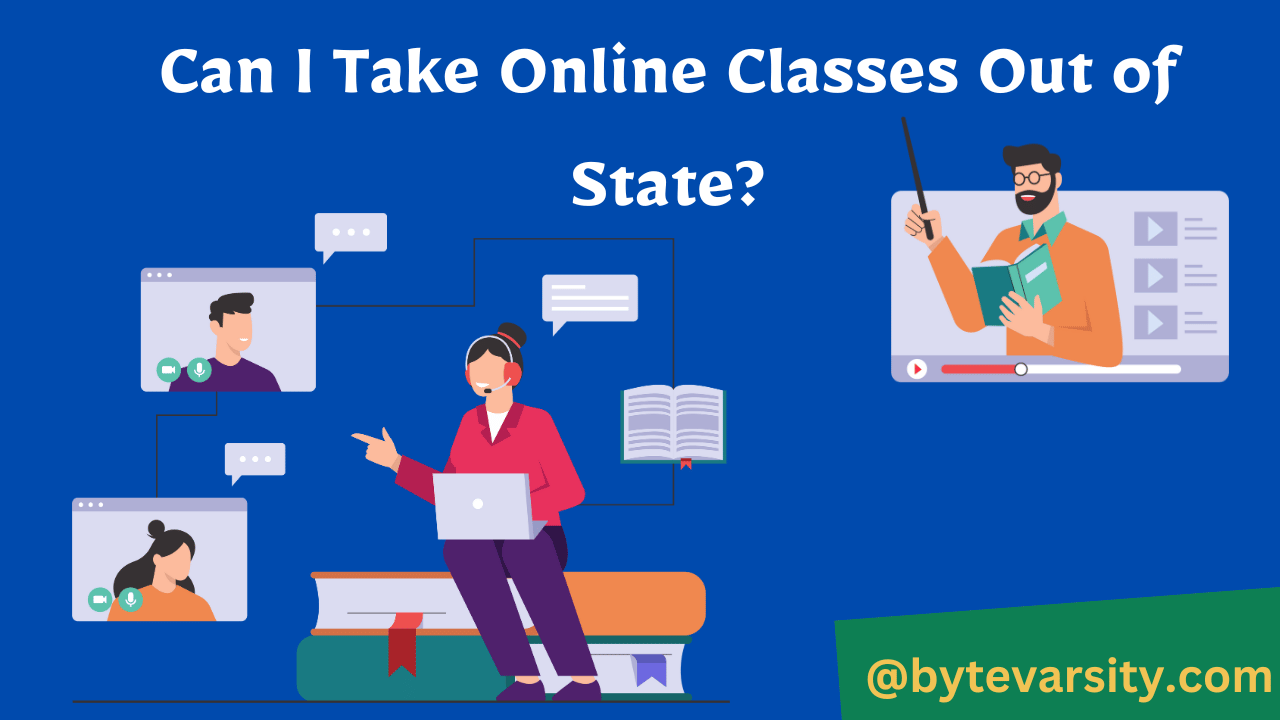Can I Take Online Classes Out of State?

With the rise of online learning, many students are wondering whether they can take online classes out of state. The answer is yes, but there are some important things to consider. In this article, we will explore the benefits and challenges of taking online classes out of state and provide some tips for making the most of your online learning experience.
Contents
- 1 What are online classes?
- 2 Benefits of taking online classes out of state
- 3 Challenges of taking online classes out of state
- 4 Tips for taking online classes out of state
- 5 Tips for taking online classes out of state (continued)
- 6 Conclusion
- 7 FAQs
- 7.1 If I move states, will I automatically be charged with out-of-state tuition?
- 7.2 Can I move out of state and still take online classes at my current community college?
- 7.3 Can I do my online college courses if I move out of state in the middle of my semester?
- 7.4 Can someone take online classes in a university in one state while living in another state?
What are online classes?
Before we dive into the topic of taking online classes out of state, let’s first define what online classes are. Online classes are courses that are delivered over the Internet, allowing students to access course materials, participate in class discussions, and complete assignments from anywhere with an Internet connection.
Online classes are often used in distance education programs, but they are also becoming increasingly popular in traditional higher education settings. You can take online classes of any course like SAT Prep Courses, Data Science, Project Management, Software Development, and many more.
Before we dive into the topic of taking online classes out of state, let’s first define what online classes are. Online classes are courses that are delivered over the Internet, allowing students to access course materials, participate in class discussions, and complete assignments from anywhere with an Internet connection.
Online classes are often used in distance education programs, but they are also becoming increasingly popular in traditional higher education settings with an increasing number of reputable and accredited online colleges. You can take online classes of any course like SAT Prep Courses, Data Science, Project Management, Software Development, and many more.
Benefits of taking online classes out of state
There are several benefits to taking online classes out of state. Some of the most significant advantages include:
1. Flexibility
One of the biggest benefits of online classes is the flexibility they offer. With online classes, you can access course materials and complete assignments on your own schedule, which is especially helpful if you have other obligations such as work or family responsibilities.
2. Access to a wider range of courses
By taking online classes, you can access a wider range of courses than you might be able to find at your local college or university. This is especially true if you live in a rural area or if your local institution does not offer the specific courses you are interested in taking.
3. Cost savings
Taking online classes can also be a cost-effective option, as you can often save on expenses such as transportation, housing, and meals. Additionally, many online courses are less expensive than their in-person counterparts.
4. Ability to study from anywhere
Finally, taking online classes allows you to study from anywhere, which means you can pursue your education even if you are unable to relocate or commute to a physical campus.
Challenges of taking online classes out of state
While there are many benefits to taking online classes out of state, there are also some challenges to consider. Here are a few of the most significant challenges:
1. Different time zones
If you are taking online classes from a different state, you may be in a different time zone than your instructor or classmates. This can make it challenging to schedule virtual meetings and participate in live discussions.
2. State-specific requirements
Different states have different requirements for online education, so it’s important to research the requirements in your state as well as the state where the institution offering the course is located.
3. Limited access to campus resources
Taking online classes means you won’t have access to on-campus resources such as libraries, laboratories, and academic advising. This can make it more challenging to succeed in your courses.
Tips for taking online classes out of state
If you decide to take online classes out of state, here are some tips for making the most of your experience:
1. Research state-specific requirements
Before enrolling in an online course, make sure you research the state-specific requirements for online education in both your state and the state where the institution offering the course is located.
2. Communicate with your instructor and classmates
If you are in a different time zone than your instructor or classmates, communicate your availability and be proactive about scheduling virtual meetings and participating in live discussions.
Tips for taking online classes out of state (continued)
Taking advantage of online resources can help you succeed in your online classes. Here are a few resources you should consider:
1. Online library resources
Many institutions offer access to online library resources, including e-books, journal articles, and research databases. Take advantage of these resources to supplement your course materials.
2. Virtual tutoring and academic support
Some institutions offer virtual tutoring and academic support services, which can be especially helpful if you are struggling with a particular subject or assignment.
3. Online study groups
Joining an online study group can help you stay motivated and engaged in your courses. Consider forming a study group with classmates or joining a group organized by your institution.
4. Create a dedicated study space
Having a dedicated study space can help you stay focused and productive. Set up a space in your home where you can study and complete assignments without distractions.
Conclusion
In conclusion, taking online classes out of state is a viable option for many students, but it’s important to consider the benefits and challenges before making a decision. By researching state-specific requirements, communicating with your instructor and classmates, and taking advantage of online resources, you can make the most of your online learning experience.
FAQs
If I move states, will I automatically be charged with out-of-state tuition?
It depends on the policies of the institution you are attending. Generally, if you are classified as an out-of-state student, you will be charged higher tuition rates than in-state students. However, some institutions have policies that allow students who move out of state to maintain their in-state tuition status for a certain period of time. It’s important to research the policies of your institution and speak with an advisor to understand how your tuition status may be affected if you move to a different state.
Can I move out of state and still take online classes at my current community college?
Yes, in most cases you can move out of state and still take online classes at your current community college. However, it’s important to check with your institution to ensure that they allow students to take online courses from out of state. Additionally, you may need to research the state-specific requirements for online education in both your current state and the state where you plan to reside, as different states may have different requirements for online education.
Can I do my online college courses if I move out of state in the middle of my semester?
Yes, you can continue to take your online college courses if you move out of state in the middle of the semester. However, you should make sure to inform your institution of your change of address and check with them to ensure that you are still eligible to take online courses from your new state. Additionally, you should research the state-specific requirements for online education in both your current state and the state where you plan to reside to ensure that you are in compliance with all applicable regulations.
Can someone take online classes in a university in one state while living in another state?
Yes, someone can take online classes in a university in one state while living in another state. Online courses are designed to be accessible from anywhere with an internet connection, so students can take courses from institutions located in other states.
However, it’s important to research the state-specific requirements for online education in both the state where the institution is located and the state where you reside. Some states may have specific regulations or requirements that you need to meet in order to take online courses from an out-of-state institution. Additionally, you should check with the institution to ensure that they allow out-of-state students to enroll in their online courses.




